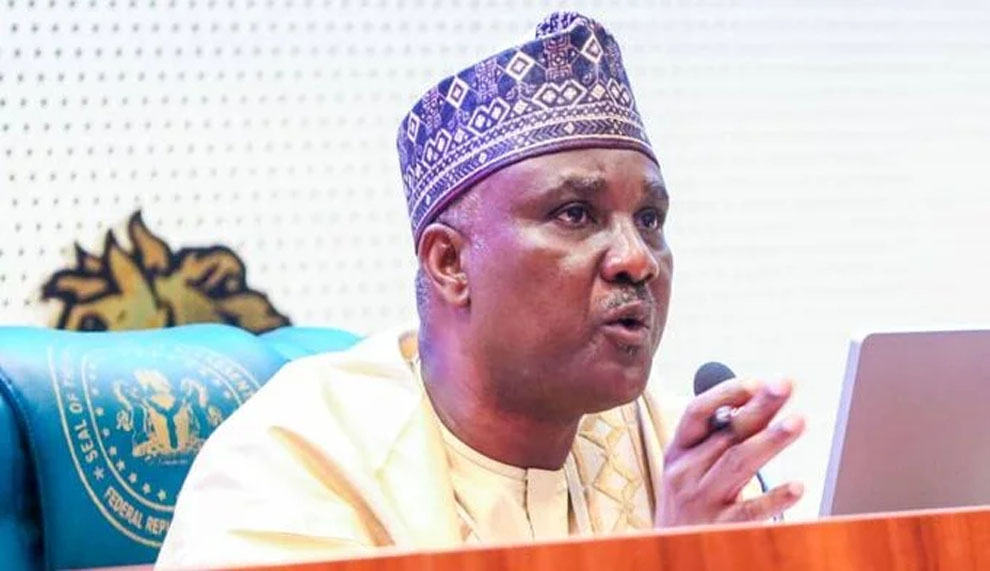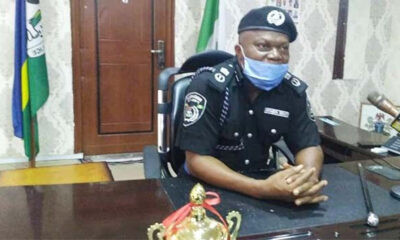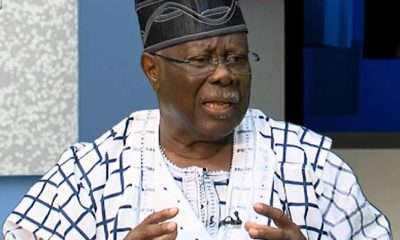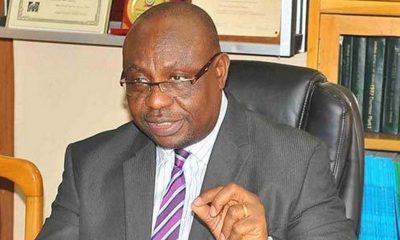News
Constitution review: Lagos participants call for true federalism

Participants at the ongoing Lagos zonal public hearing on the 1999 constitution review have called for a total amendment of the constitution to reflect true federalism.
Topping the list of issues presented was the need for total devolution of powers whereby the local government system has the greater share and so is empowered to carry out effective administration of the polity since it is closest to the people.
Participants also called for creation of state police, re-inclusion of Magistrates in the constitution, review of the retirement age of Magistrates from 60 to 65.
There were also calls for a declaration to make the Higher National Diploma (HND) equivalent to the university degree; need to ensure gender equality, as well as revenue allocation.
The two-day public hearing, holding at the Lagos Marriott Hotel, Ikeja, started yesterday. It was attended by Governor Babajide Sanwo-Olu (host), Senator Oluremi Tinubu (Lagos Central and Chairman of Hearing Committee), Olamilekan Adeola (Lagos West), Tokunbo Abiru (Lagos East); Senators Ibikunle Amosun, Tolu Odebiyi (Ogun State); Senators Teslim Folarin and Abdulfatai Buhari (Oyo State), among others.
Governor Sanwo-Olu, who opened the event, noted that the constitutional amendment process would provide Nigerians the opportunity to express their minds on issues they want reflected in the constitution. ‘This is what true democracy is all about – the exercise of the sovereign will of the people. The voices and wishes of the people must always be heard loud and clear, regarding how they are being governed and how they wish to be governed,’ he said.
The governor, who also said it would be impossible to reflect every expressed wish in the revised constitution, urged the people adopt the spirit of give-and-take, ‘with a willingness to mutually compromise and avoid unnecessary tension and division along the way’.
He added: “For us in Lagos State, the issues of state police and fiscal federalism top the priority list for us. Equally fundamental is the issue of a special economic status for Lagos, considering our place in the national economy and the special burdens we bear by virtue of our large population and limited land mass. I believe the need for this special status has been sufficiently articulated and justified. It suffices for me at this point to restate that this request is by no means a selfish one, but one that is actually in the interest of every Nigerian and of Nigeria as a nation. The progress and prosperity of Nigeria is inextricably linked to the progress and prosperity of Lagos State. A special status for Lagos State therefore must be a concern not only for the people of Lagos State alone, but for all Nigerians.”
Deputy Speaker of the Lagos State House of Assembly Wasiu Eshinlokun Sanni, who represented the Speaker Mudashiru Obasa, also reiterated the need for Lagos to get a special status. He advocated 30 per cent derivation on natural resources for the domiciling states, as well as the criminalisation of undue interference in activities of the legislature by the executive.
Sanni added that it was also expedient that state police be created to improve security at the grassroots.
Lagos State Attorney-General and Commissioner for Justice Moyosore Onigbanjo advocated an amendment of the unitary constitution to a federal one, among other prayers.
He said: “The constitution we operate now is unitary; but we seek amendment of this document so it would operate true federalism. The exclusive legislative list used to have just nine items, but it increased to 68 items. The centre keeps grabbing power that should otherwise be exercised by states, and we are saying we should go back to the system whereby the state’s list has more items because they are closer to the people and so their powers should not be taken away.
“We also believe that states should have the exclusive powers to create local governments and not seek federal approval. The states know the number of local governments that will suffice and render quality service to its people, so it should be given the powers to do so.
“The policy which also apportions 52.68 per cent of revenue collected in the country to the federation account is not fair, equitable and just. We are proposing a radical change where the Federal Government gets 34 per cent, states 42 per cent and local government 23 per cent.
“The principle of derivations should also apply to every revenue-generating natural resource in states, and not apply to only petroleum. Any state that has the resources where revenue is derived must be entitled to the derivation principle. This must cut across all resources generating revenue for government.
“We also propose that the Value Added Tax (VAT) act be repealed by the National Assembly because it prevents states from utilising the sales act to generate revenue and this has caused confusion and a lot of court cases. We also propose that appointment and promotion of judges should lie with the Judicial Service Commission (JSC) of states and not the National Judicial Council (NJC).”
State Chairman of the Christian Association of Nigeria (CAN) Rev. Stephen Adegbite queried the establishment and functionality of sharia courts since the constitution said there would be no state religion. He hinted that CAN might be forced to vie for Canon courts in the spirit of equity and justice.
Chairman of the Nigerian Labour Congress (NLC) Comrade Ayuba Wabba insisted that labour and the national minimum wage be retained on the exclusive legislative list. He argued that since Nigeria has domesticated 26 of the International Labour Organisation (ILO), which governs labour matters, ‘it would be anomalous, incongruous and contemptible of global standards and order to even contemplate removing labour from the Exclusive Legislative List’.
He said: “Any contemplation to remove the national minimum wage from the exclusive legislative list to the concurrent legislative list would only expose Nigeria to international ridicule and opprobrium.
“Our prayers are that the National Assembly should retain the national minimum wage on the exclusive list as currently listed in the 1999 constitution, and also retain the general administration of pension as currently captured in Section 173 of the 1999 constitution.
“We also pray that the National Assembly should favourably consider our demands for the full realisation of local government autonomy, legislative autonomy and autonomy for the judiciary arm of government.”
Senator Tinubu, who read the welcome of the Deputy Senate President Ovie Omo-Agege, said the zonal hearings were coming before the national hearing because the senate decided to adopt a bottom-top approach by first listening to Nigerians at the geo-political level.
She said: “A constitution review represents a critical phase in our development and advancement as a nation. At the commencement of this ninth Senate, we had set for ourselves a legislative agenda as a basis on which we are to be assessed. Sitting prominently in that agenda is the need to address, by way of constitutional amendments, topical issues like judicial and electoral reforms, local government autonomy, and devolution of powers. If we get those items through constitutional processes of alteration successfully, then our constitutional democracy will be set on the right pedestal and, ultimately, Nigeria will take its pride of place among the enviable constitutional democracies in the world.
“The success of the review process will be dependent on your beneficent support and partnership. This exercise is your exercise and I implore you all to embrace and own it.”
Issues to be addressed in the hearing would bother on increased participation of women and vulnerable groups in governance, local government administration and autonomy, state police, fiscal federalism and revenue allocation, judicial reforms, electoral reforms, among others.
News
Ohanaeze Ndigbo President-General raises alarm over threats to his life

Ohanaeze Ndigbo President-General raises alarm over threats to his life
Emmanuel Iwuanyanwu, the President-General of Ohanaeze Ndigbo, has expressed concern over threats to his life by individuals he described as anti-Igbo. He revealed that there have been plans to either kill him or burn his house due to his leadership of Ndigbo.
Addressing a press conference in Enugu, Iwuanyanwu highlighted the dangers he faced, mentioning the death of his predecessor, Prof George Obiozor, and an attempt on another ex-leader’s life. He recounted receiving information about people hired to attack him but assured that he remained undeterred in his commitment to serving his people.
READ ALSO:
- Your husband is not your partner, he is the head – Daddy Freeze tells Nigerian women
- Cleric allegedly sets wife’s house ablaze following prayer disagreement in Ekiti
- UCL: Real Madrid beat Bayern to book final ticket …to face Dortmund in London
Iwuanyanwu lamented being confronted by such threats despite his efforts to serve his people, citing his extensive career and scholarship schemes that benefited thousands of youths. He recalled the fate of late Prof. Joe Irukwu, who faced similar accusations of working against the interest of Igboland.
Despite the challenges, Iwuanyanwu reaffirmed his determination to serve Ndigbo and vowed not to yield to intimidation.
Ohanaeze Ndigbo President-General raises alarm over threats to his life
News
Rivers crisis festers as new factional Speaker emerges

Rivers crisis festers as new factional Speaker emerges
A new speaker has emerged in Rivers State Wednesday May 8, 2024, to signal the much-awaited showdown in state’s deteriorating political crisis which seems to be here.
Already, hidden cards or fists are appearing every hour to show that both the Nyesom Wike camp and the Governor Siminalayi Fubara camp have been preparing for it.
The Wike camp through the Rivers State caretaker committee of the All Progressives Congress (APC) led by Tony Okocha yesterday gave go-ahead for impeachment action against the governor. The one they one the 27 defected lawmakers loyal to Wike initiated on October 30, 2023, failed when Gov Fubara fought back until a temporary ceasefire was achieved in Aso Rock with an 8-point agreement signed by both parties but largely observed in breach.
Now, it seems both camps have rearmed and may be ready for the final showdown that may make Rivers State tense in the coming days, to say the least.
READ ALSO:
- Cybersecurity levy suspension tears lawmakers apart, speaker overrules
- EFCC to arraign Sirika, daughter over fresh N2.7 billion contract scam
- Breaking: Fubara bars all LGA heads from appearing before Rivers Assembly
The APC has directed that impeachment begin immediately; the next day, the Fubara camp announced their own Speaker, Victor Oko Jumbo from Bonny; same day, hints emerge that screening of LGA caretaker committee members may be going on.
On the other hand, the local councils have staged protests saying their monthly allocations have been withheld. Pressure is thus mounting from that angle covering the 23 local council areas.
The purported screening may lead to appointment of caretaker committees of the 23 LGAs in the state who would get the monthly allocations and hit the ground running.
This action would provoke what the Wike-backed APC group said they would resist. They may begin their own action in the form of impeachment proceedings which the Fubara camp (Rivers State government) said they would resist.
These acts of resistance may plunge the state into violence and make it ungovernable. At that point, President Bola Ahmed Tinubu, who has remained silent since the peace agreement, may unveil the sanctions he had threatened would descend on any person who breached the agreement. Each camp points to the other as the one breaching the agreements. Each clings to Tinubu as the favourite.
The battle seems timed to ensure that the one year anniversary is hindered.
Rivers crisis festers as new factional Speaker emerges
News
Cybersecurity levy suspension tears lawmakers apart, speaker overrules

Cybersecurity levy suspension tears lawmakers apart, speaker overrules
The Speaker of the House of Representatives, Abbas Tajudeen, intervened on Wednesday to halt a motion calling for the suspension of the controversial cybersecurity levy, which has sparked widespread dissatisfaction among Nigerians.
Since the Central Bank of Nigeria (CBN) mandated all banks to deduct 0.5% of the value of electronic transactions from customers, Nigerians from various sectors have vehemently opposed the levy, labelling it an additional financial burden.
During Wednesday’s plenary session, Manu Soro, a lawmaker from Bauchi State, presented the motion, citing concerns about the timing of the levy’s introduction amidst Nigeria’s prevailing economic challenges.
Soro argued that imposing new taxes or increasing existing ones amid the current economic difficulties exacerbated by the removal of fuel subsidies and currency depreciation would only add to citizens’ financial woes.
READ ALSO:
- EFCC to arraign Sirika, daughter over fresh N2.7 billion contract scam
- Breaking: Fubara bars all LGA heads from appearing before Rivers Assembly
- Russia urges Israel to comply with international humanitarian law in Rafah
He called on the House to urge the CBN to retract the circular on the cybersecurity levy and halt its implementation immediately. Additionally, he urged the Minister of Finance to refrain from introducing new taxes or raising existing rates until the economic situation improves significantly.
However, Speaker Abbas advised Soro to temporarily withdraw the motion to allow the House leadership to deliberate on the best course of action to address the issue.
In a related development, the Trade Union Congress of Nigeria (TUC) threatened to shut down the economy over the plan to implement the cybersecurity levy on electronic transactions. TUC’s president, Mr. Festus Osifo, criticized the levy as illogical, particularly given the current economic challenges faced by Nigerians. He warned that its implementation could worsen poverty and deepen the economic crisis in the country.
Cybersecurity levy suspension tears lawmakers apart, speaker overrules
-

 International2 days ago
International2 days agoNetanyahu rubbishes Hamas ceasefire proposal
-

 Politics2 days ago
Politics2 days agoAbia deputy gov candidate, lawmaker dump PDP
-

 News3 days ago
News3 days agoNigerian varsity VC suspended over alleged gross misconduct
-

 metro1 day ago
metro1 day agoEkiti university expels students over viral bullying video
-

 Sports2 days ago
Sports2 days agoOlise scores twice as Crystal Palace trash Manchester United
-

 metro2 days ago
metro2 days agoThree siblings attack school teacher for flogging brother in Port Harcourt
-

 metro5 hours ago
metro5 hours agoCleric allegedly sets wife’s house ablaze following prayer disagreement in Ekiti
-

 Business1 day ago
Business1 day agoFuel: Independent marketers introduce new pump price





















